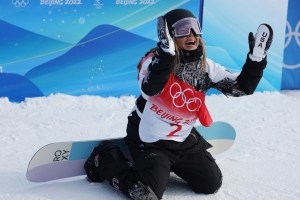
Every Olympic athlete suffers. Every Olympian, every medalist, every winner has their own long story of hardship and sacrifice. Yet, there are a handful of stories every quadrennial cycle that stand out as just a little more meaningful.
Some might characterize these as stories of redemption, a perennial issue at the Games, as I’ve noted before. Some athletes simply take a little longer to get to the top of the podium. Some are haunted, but not as much by visions of lost medals as by the media. Even a previous gold isn’t always enough to keep the demons away. It’s why the Olympics is particularly hard on also-rans. The four year interval is a killer because it takes so long to wait to try again.

Finally!
The oldest this. The longest that. The most years between the first Olympics and a win. These are the epithets that get tagged on to Olympians of an entire class. Winter athletes work in harsh and dangerous conditions, conditions for the young. Yet, there are 30-year-olds in the mix, because it takes experience to slice off that extra edge next to a slalom gate or to squeeze a few inches in front of the snowboard cross racer behind you.
While U.S. media were obsessing over why two-time gold medalist Mikaela Shiffrin had skied off course, Switzerland’s Lara Gut-Behrami was wondering whether her 30-year-old legs would be enough. She’d won Super-G titles, going all the way back to 2014, but she had only managed fourth in Sochi. There was a bronze, but it was in the downhill, and she had only managed bronze again earlier in the week in the Giant Slalom. Bronze was better than fourth, but…
Gut-Behrami had been racing for a decade before even making the 2014 Sochi team. She had missed Vancouver because she dislocated her hip a few months before qualifiers. She had missed Pyeongchang due to a torn meniscus. The ramifications of injury extend beyond just a few months, too. The body can only take so much, and her peers and teammates this year were younger, without as many repaired body parts. Slalom races are over in less than a minute and a half. “I was so nervous in the finish someone would come faster,” she said after starting seventh and waiting for 37 others to fly down the course. At age 30, Gut-Behrami finally won her Olympic gold medal.
Austria’s Benjamin Karl knows how Gut-Behrami feels. Karl races in the snowboarding parallel slalom, doing on a snowboard what Gut-Behrami does on skis. With one difference–there’s another racer right next door. Skiing only does this in the mixed team event, but it’s more exciting than the running clock.
Karl lost by less than a second in Vancouver, 12 years ago. He’d missed making the finals by a hairsbreadth in Sochi. He’d been nowhere close in 2018. Was it even possible to keep racing, age 36, on this sport that favors young knees? Shaun White tried it on the half-pipe and, despite a valiant effort, was blown off the course by the much more agile young tricksters.

But here was Karl, facing off in the finals against Slovenia’s Tim Mastnak. In an early gate, Karl’s board skidded, and Mastnak took a clear lead. Mastnak, himself age 30, also had the experience to take advantage, but then his board suffered a little skid. Karl took the lead back and finally, finally won the race. Mastnak was excited to earn his very first medal. Karl was ecstatic, punctuating his win by saying that earning the gold was his “life project.”
Primal Scream and a Kiss
When Italian short-track skater Arianna Fontana crossed the finish line, she let out a rather noticeable scream. Primal? Angry? Passionate? She then skated over to her husband coach, Anthony Lobello, and laid one on him.

Unlike the new medalists above, veteran Fontana had won medals before. She has a closetful of Olympic accolades–ten medals, including a gold. She has a slew of world championships, and three-page-scrolls-down worth of European championships. What might be left to prove?
The problem, said Fontana, was that her husband /coach, Anthony Lobello, was not approved by the Italian team. “I had male athletes (Italians) targeting me on the ice, made me fall, try to attack me every time they got a chance so it was not safe for me to stay with the team.” she told the press. “My federation wasn’t really supportive with me having my husband as a coach.” She and her husband had to move to Hungary to train.
Thus, this gold was a particularly sweet kind of revenge for Fontana, who says the team still hasn’t acknowledged the accomplishment. Coach says his wife isn’t ruling out the next Games either. Even at age 36, she might be in shape to qualify. Whether she still has to train in Hungary the whole time is still undecided. But their support for each other will be unwavering.
Release
Speed skating seems to accommodate veterans. Figure skating does not. Whether it’s the inability to endure constant media focus or the difficulty of defying both the body and gravity, figure skaters skew young for a reason. It’s hard for a teenager to handle expectations. When American Nathan Chen skated in his short program in 2018, nerves got the better of him. Despite having the ability to land quads with breathless ease, Chen crashed in the early round and landed in 17th. He bounced back to win the free skate, moving up 12 places–to finish off the podium in fifth.
Since then, Chen has won nearly every competition he’s entered. Season after season after season after season–that’s what four years of waiting means. He would seem a lock for gold. Yet being expected to win, especially for a figure skater and an American one at that, makes it that much harder.
Chen was the poster child for NBC and Team USA this year. He was the banner at the top of all the websites, the headliner in prime time, the star of the funny commercial and the inspiring commercial. Simone Biles played that role last year and found it to be all a bit much. But Biles had her gold medals. Nathan Chen, the face of the 2022 Games, didn’t have a gold.

In skating, you lose because you fall. It’s the nature of the sport. Skaters rely on physics, a slippery surface, body mechanics, and athletic thighs. A century ago, figure skaters were barely landing two rotations; now they complete four. At least one athlete is close to landing four-and-a-half, and five will not be far behind. But even if a skater lands one of those quads, then they have another, and another. Today’s long programs have six jumps. Even Nathan Chen, the “quad king” according to American media, has six times to fall.
When Chen, skating to Elton John’s “Rocketman,” made it through all his quads, it was less gaining satisfaction and more about purging the expectations. Like other skaters, the look on his face isn’t really joy but relief. It was over.
Tears of Joy
Even gold medalists can cry when they repeat. Especially given what’s happened over the last four years. Kim’s electrifying win in the 2018 half-pipe was inspirational. She was the first Asian-American, the youngest woman to complete certain tricks. She was showered with accolades, deservedly so, from a Sports Illustrated cover to action figures.

She was also showered with racist messages, constantly trolled by social media. “Go back to China…stop taking medals away from ‘our team’…” Dozens a day. After the outbreak of COVID, amidst a wave of anti-Asian sentiment and crime, she started carrying a taser and pepper spray with her.
So even the highest profile, most likable, most lauded Olympian can still feel the need to achieve even more. Whatever voices Chloe Kim has been hearing, she silenced them with a blistering first run in the 2022 finals, blowing out the half-pipe with a score of 94 on the first run. Then, the tears flowed as she became the first woman to earn back-to-back golds in the event. Maybe she can stop looking behind her shoulder now.
A New Asterisk
And then there is Lindsay Jacobellis.
Jacobellis has her own unique place in history–or had. Sixteen years ago, in the first Olympic snowcross race, she was a wet-behind-the-ears racer, an X Games competitor helping to bring a new sport to the public in Turin. She had a huge lead near race end because she is and has been a badass snowboard athlete from the time she was old enough to stand upright. Being so far ahead in this show “extreme” sport, she tried a trick too close to the finish. An unnecessary trick, a boast, a showboat, and X Games kind of thing.
Only this was the Olympics, not ESPN. And her country lost a medal when she fell. Or as the New York Times put it–just this week–she “squandered” a medal. She never saw it that way, despite being asked every flippin’ four years why she had made such a huge mistake. Jacobellis shrugged it off, disappointed but lesson learned. She went on to win sackfuls of trophies. Never quite that Olympic medal, with a fourth here and a seventh there.
But she kept competing because she’s good and she loves it.
Last Wednesday, Jacobellis faced off against Chloe Trespeuch of France, Meryeta O’Dine of Canada, and Belle Brockhoff of Australia. This time, there was no big lead, just a slow and steady move to the front, a careful spacing around turns to put inches between her and Trespeuch. The race was less than two minutes long. Less than two minutes and Jacobellis could finally cross that Olympic finish line in front.

There was a clearly audible scream at the finish, though it didn’t come from Jacobellis. Her U.S. teammates were the ones who let loose, teammates who have admired her and who know how much scrutiny has been put on her shoulders. Teammate Stacy Gaskill explained, “She is the face of this sport. To see her win, and finally get back on top of the podium, it means everything to all of us, especially Lindsey. We’re all so proud.”
Australia’s Brockhoff, who missed the podium, said, “I would use her as an inspiration for what kind of boards I wanted to use, bindings, boots, everything … for her to come out here and not give up is pretty inspirational.”
For anyone who’s asking, she’s never felt “haunted,” and she long ago stopped kvetching about redemption. “That was not in my mind. I wanted to just come here and compete… [redemption is] not why I race.”
Jacobellis had started these Games as a cautionary tale, about the hare and the tortoise. Now she has flipped the story, staying in the game year after year, becoming the tortoise. She has finally caught her younger self and moved on. While Jacobellis might be mentioned in the future , her name will now carry an asterisk for a different reason.
Especially when, just for good measure, Jacobellis joined teammate Nick Baumgartner in pushing toward the front in the Mixed Team Snowboard Cross event. Baumgartner had himself repeatedly missed out on medals and had also kept competing.
At age 40, Baumgartner became the oldest medalist in Olympic snowboarding history, next to his oldest female partner, Lindsay Jacobellis.
Clearly nothing more to haunt these athletes. It’s time to stop asking.


I loved reading that, and I didn’t even watch this year. Choked up.
You should win a good for writing!
Thanks buddy!